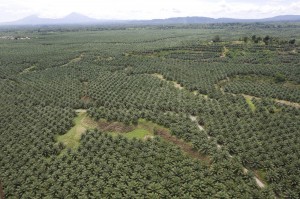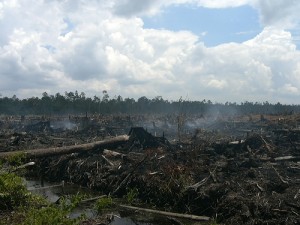
Did you see The New York Times Op-Ed on Saturday titled “The World Bank’s Palm Oil Mistake“? I sure did.
The author, Thompson Ayodele, provided a narrow perspective on the World Bank’s recent decision to continue it’s freeze on new lending to palm oil projects around the world until it’s framework and strategy is clarified. In his lopsided “Greens vs. the Poor” argument, Ayodele argues that the World Bank’s decision is unfair because people in countries like Nigeria depend on palm oil for economic development.
What Ayodele fails to understand is that though palm oil may be a successful development mechanism in countries like Nigeria and Ghana, where smallholder farmers control more than 90 percent of palm oil production, in Indonesia and Malaysia, the lion’s share of palm oil operations that the World Bank’s loans contribute to are large scale, export-based palm oil plantations that cause land conflicts and widespread species extinction, not to mention destroy irreplaceable rainforests that keep massive global climate change at bay.


The Bank’s lending arm, the IFC, came under fire in early September when Sawit Watch and Indonesian allies garnered almost 200 signatures from organizations around the world pleading the IFC to halt funding destructive palm oil development in Indonesia and Malaysia.
Indonesia and Malaysia together produce almost 90% of the world’s palm oil supply which ends up in millions of day to day products found in U.S. markets such as Revlon eyeliner, Nabisco oreo cookies and thousands of “healthy, organic” food alternatives such as Organic Valley granola bars.
Since 1965, the World Bank has channeled nearly $2 billion for 45 projects in the palm oil sector in 12 nations across Africa, Latin America and Southeast Asia. Indonesia has been a major focus of the financing, receiving $618.8 million of the total funding.
But last year, the World Bank could no longer ignore the complaints and in August 2009, World Bank President Robert Zoellick suspended all palm oil funding and announced a comprehensive palm oil strategy. The World Bank Group is “developing its global approach in the palm oil sector through an open and participatory process, engaging a diverse group of stakeholders. The approach will outline a set of principles to guide the World Bank Group’s future engagement in the palm oil sector with the key goal of maximizing development outcome for the communities and minimizing adverse social and environmental impacts of the sector.”
However,the new World Bank Draft Framework for Palm Oil is a farce in the eyes of many community groups.

Two days before Ayodele’s Op-Ed appeared in the New York Times criticizing the World Bank, palm oil came under attack by another big W: Walmart. Walmart announced its commitment to sustainable palm in all of their private labels by 2015, following in the tracks of General Mills, Nestle, and Unilever.
According to Mongabay,
“This is an important signal from a major market actor, also key for the Chinese market. Oxfam has modestly supported palm oil allies in the lobby to achieve this. Sourcing sustainable palm oil for their U.K. (Asda) and U.S. private brand products alone will reduce greenhouse gas emissions by 5 million metric tons by the end of 2015. The second key element is on beef: only from sources that do not contribute to the deforestation of the Amazon rainforest.”